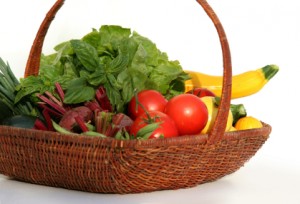
Eating a balanced diet is an important part of maintaining good health and can help you feel and look your best.
While doing some research for this topic, I was able to read many “definitions” of what constitutes a balanced diet. Of all the information I reviewed, the definition I believe describes a balanced diet the best is published by dictionary.com. Their definition of a balanced diet is “a diet that contains the proper proportions of carbohydrates, fats, proteins, vitamins, minerals, and water necessary to maintain good health.” It’s simple, scientific, and to the point.
It’s important to note that nowhere in the definition does it say the best diet to make you skinny. The focus is on health.
When it comes to connecting food and your health, diversity is important. Each nutrient contributes to the overall function of your body and if one nutrient is missing, it doesn’t function as well as it could.
It’s easy to get into a routine eating the same foods often. Things like busy schedules and taste preferences can be a factor. However, minimal food variation and/or elimination diets can cause you to miss out on some important nutrients that your body needs to help you age gracefully and combat disease.
Thankfully, in the United States and many other countries around the world, we all have access to clean water so staying hydrated is one of the simplest parts of maintaining a balanced diet.
How do you know when you’re getting enough water?
The best way to tell if you are hydrated is the color of your urine. Clear to pale yellow is ideal. Yellow to dark yellow means you need water and if it looks like tea or beer ,you are dehydrated! Supplements can also cause urine to be dark yellow so keep that in consideration.
Avoid allowing yourself to get “thirsty.” If you are getting a thirst signal, then the body is already too low on water!
Diet is very personal and we all have different energy requirements which is why it’s important to experiment and figure out what works best for you. For example, some people need to consume more carbohydrates than others. However, science proves that we need them to function at our best throughout the day.
At first, creating a balanced diet can seem a bit daunting if you are unsure which foods fall under the different categories. Many foods supply multiple sources of nutrients so a diverse diet that includes lots of fruits and vegetables is usually your best bet. I’ve put together some samples of carbohydrate, protein, and fat sources below to help you get started.
Examples of carbohydrates: Fruit, root vegetables such as potatoes, beets, and carrots, whole-grain products such as brown rice, whole-grain pasta, beans, whole wheat bread, whole oats, buckwheat, millet, whole rye, whole-grain barley and whole-grain corn, and quinoa (it’s technically a seed) are all carbohydrates. These foods are rich in fiber, vitamins, minerals and phytonutrients that are beneficial to your health.
Examples of protein sources: Meat, poultry, fish and shellfish, dairy, nuts and seeds, beans and peas and other plants like quinoa, avocado, hemp, and soy are all protein sources. I personally recommend avoiding soy; however, I’m listing it because it is considered a “complete” protein source. If you like to eat it, I recommend sticking to the organic soy and limiting your consumption. Bragg aminos are a great substitute for traditional soy sauce.
Examples of fat sources: Oils like olive, walnut, avocado, grape seed, peanut, and coconut are all good sources of fat. Avocados, nuts and seeds, meat, fatty fish, dairy, nut butters, olives, and dark chocolate are all considered fat sources as well. Oils I personally avoid are any oil that is partially hydrogenated, canola, and palm oil.
Balanced Diet Research
Current research continues to prove that a whole food driven balanced diet (eating food in as close to its natural state as possible) is one of the best ways to fuel your body mentally and physically. In fact, recent studies have shown that a whole food driven diet can actually boost your metabolism compared to a diet made up of processed foods which can cause your metabolism to slow down dramatically.
I personally believe it’s a good idea to eat as many whole foods as possible and to limit refined and heavily processed food in our diets. Eating whole foods can help contribute to better energy. With that being said, it’s also important to enjoy your food and not get too rigid about everything we eat. Overly religious behavior around food can lead to dieting which can lead to stress and heartache which does not support mental health in a positive way.
Part of being healthy is to find balance in your life and allow yourself to enjoy the foods and drinks you like. Life is too short to be on a diet!
Shared with love,
Jennifer
Disclaimer: The information in the above article is based on general nutritional guidelines and is not intended nor should be considered a substitute for any advice provided by a medical professional.


